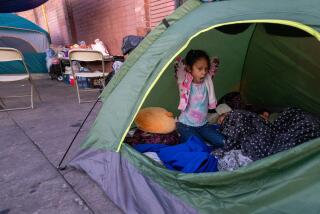Portland Eatery Feeds Dignity to the Down-and-Out
- Share via
PORTLAND, Ore. — Jeb Hollinson lives downtown.
Way downtown.
When he put the touch on a stranger for a handout recently, he expected some spare change, not a small blue ticket.
The ticket was good for a meal at the Sisters of the Road Cafe, an 18-year-old fixture in the heart of Portland’s Skid Road, where down-and-outers can work for meals or get them at rock-bottom prices, and do so with dignity.
“They don’t expect nothing from you,” Hollinson says over a plate of spaghetti.
“Up at the missions, why, they pray at you for a long time, and the food. . . ,” he adds with a shake of his shaggy head.
The cafe has expanded twice and serves about 300 meals a day now, most for $1.25, a $1 food stamp or for as little as 15 minutes of work.
“Oh, yeah, a lot of people would go hungry if it weren’t for this, depend on it,” agrees William Hopper, who began coming to the cafe years ago, when he was on the street.
Now, he is a housekeeper at Oregon Health Sciences University, but he still works for his meals at Sisters of the Road.
“I clean tables, mop floors, whatever,” he says. “It’s reliable, and it’s easy to get money on the books. I can work as little as 10 minutes and get money on the books.”
The “on the books” credits never expire and can always be used for meals.
“This is not a mission; it’s a restaurant,” says Christine Fry, the projects director. “We have to meet the same health codes as other restaurants in the state.”
Thus, Sisters of the Road cannot use donated outdated food, which is common at missions. The end of the federal surplus food program last year also hurt.
But cheap, simple meals still are available. Meals are given away only if a person cannot work and has no money or is disabled.
“It allows them to eat a meal with dignity,” Fry says. “They’re not asking for a handout. People who barter [work for meals] have real jobs, and they help us meet the higher health codes.”
Some have regular jobs there.
“More people want to work here than we have jobs for,” Fry says. “Many leave because they relapse into drug problems or because of mental instability. Some homeless people simply have problems adjusting.
“But if they can stay long enough to find housing, they often stay for a good deal of time. If not, they often are out in a couple of months.”
Portland’s old Skid Road--located around Burnside Street on the north end of the downtown area--is still the magnet for down-and-outers it has been for more than a century, despite efforts to gentrify it.
The restaurant’s symbol is a circle with three X’s in it: the hobo sign for good food.
Sisters of the Road was founded in 1979 by Genevieve Wilson and Sandy Gooch, who were working with homeless women and wanted a safe place for them to go.
“Sisters of the road” is a term female transients have used to describe themselves. The name was popularized by Boxcar Bertha, a Depression-era female hobo and advocate, in her autobiography, “Sister of the Road.”
Sisters of the Road is a product of the times.
During the 1960s and 1970s, domestic violence began to get more of society’s attention, and more and more women and children were fleeing abusive homes, often to become homeless.
The problem grew with the return of many Vietnam War veterans, who were unable to readjust to civilian life.
It costs about $320,000 a year to run the cafe. Private donations cover about a third of it. Special events and grants by corporations help make up the rest. Only rarely is government money involved.
More money is raised by the sale of the meal tickets, often sold in large lots to churches and other organizations, to be passed out to panhandlers.
Everybody is welcome at Sisters of the Road, and all kinds come through the door. Problems with drugs, alcohol and violence are fairly common.
“We see everything that’s out there,” Fry says. “Everyone is accepted, regardless of condition, as long as they behave.”
About 40 people get their mail at Sisters of the Road.
The newest expansion will include a library on nonviolence and a computer--for writing resumes and letters or learning how to get a restraining order.
“If you’re going to change your life, it’s difficult if nobody cares,” Fry says.
More to Read
Eat your way across L.A.
Get our weekly Tasting Notes newsletter for reviews, news and more.
You may occasionally receive promotional content from the Los Angeles Times.







